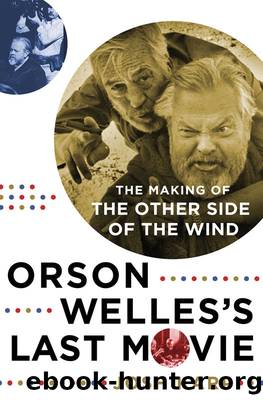Orson Welles's Last Movie: The Making of the Other Side of the Wind by Josh Karp

Author:Josh Karp [Karp, Josh]
Language: eng
Format: epub
Tags: Performing Arts, Individual Director, Biography & Autobiography, Entertainment & Performing Arts, Film, History & Criticism
ISBN: 9781250092342
Google: Xe3IBAAAQBAJ
Amazon: 1250092345
Barnesnoble: 1250092345
Publisher: St. Martin's Griffin
Published: 2015-04-21T04:00:00+00:00
ACT THREE
1975â1985
Who do I have to fuck to get out of this picture?
âORSON WELLES, DURING A MOMENT OF ON-SET FRUSTRATION IN 1975
1975
He was always respectful of the crew, right up until he fired us.
âCREW MEMBER JACK EPPS JR.
The beginning of the end, as is sometimes the case, wasnât a moment of darkness or impending doom. Rather, it was a time of hope.
It was the beginning of an end that would come neither swiftly nor in a gigantic explosion. Instead, it came gradually and continued into eternity.
The end began when a small committee from AFI met at the Beverly Hills Hotel to choose the recipient of their third Life Achievement Award. The options included everyone who wasnât Ford or Cagney. The group chose Welles because they believed his artistry had been superlative and that with the selection, they were making a significant statement about their organization.
âIt was a way of saying we were serious about this award and that it wasnât going to be a popularity contest,â said AFI founding director George Stevens Jr. âWe made the choice on the grounds that it was a choice of great integrity.â
Though the committee was pleased with its decision, others were not, including several AFI members and certain factions of the Hollywood press. Kirk Douglas was outraged, and his indignation was seconded by everyone from Henry Hathaway to columnist Marilyn Beck and one of the editors at Variety, where McBride was now a reporter. All shared the belief that Orsonâs body of work boiled down to Citizen Kane and a bunch of films that might have been.
Joining the chorus of dissent was Patton producer Frank McCarthy, who expressed his feelings to the event co-chairs in a letter stating that he couldnât understand why Welles was receiving the award, when one compared him with Darryl Zanuck, Jack Warner, and other deserving Hollywood titans.
But then there was William Wyler, a potential recipient who went out of his way to congratulate Orson, as well as many staunch defenders, including Charlton Heston and Frank Sinatra, the latter of whom acted as master of ceremonies for the February 9 award show, which aired a few days later on CBS. And of course there was Bogdanovich, who fielded the call from Stevens asking if Welles would even accept the award.
Though he was excited about the opportunity afforded by the AFI ceremony, Welles had initially been deeply conflicted when the honor had been offered the prior year. Ultimately, however, he relented when Bogdanovich assured him that Stevensâs goal was to show that Orson was still making pictures and not headed out to pasture.
Despite agreeing to the honor, Orson wasnât cooperative. Spending nearly all of January in Europe, Welles had Bogdanovich act as his go-between with Stevens, who was growing accustomed to calls that began, âGeorge, Orson isnât happy.â
The biggest source of that unhappiness was the choice of film clips theyâd show at the ceremony and Orsonâs insistence that the only unfinished work to be shown that evening would be from The Other Side of the Wind.
Download
This site does not store any files on its server. We only index and link to content provided by other sites. Please contact the content providers to delete copyright contents if any and email us, we'll remove relevant links or contents immediately.
| Actors & Entertainers | Artists, Architects & Photographers |
| Authors | Composers & Musicians |
| Dancers | Movie Directors |
| Television Performers | Theatre |
Cecilia; Or, Memoirs of an Heiress — Volume 2 by Fanny Burney(31956)
Cecilia; Or, Memoirs of an Heiress — Volume 3 by Fanny Burney(31942)
Fanny Burney by Claire Harman(26603)
We're Going to Need More Wine by Gabrielle Union(19046)
Plagued by Fire by Paul Hendrickson(17412)
All the Missing Girls by Megan Miranda(16027)
Cat's cradle by Kurt Vonnegut(15355)
For the Love of Europe by Rick Steves(14121)
Bombshells: Glamour Girls of a Lifetime by Sullivan Steve(14075)
Leonardo da Vinci by Walter Isaacson(13336)
4 3 2 1: A Novel by Paul Auster(12392)
The remains of the day by Kazuo Ishiguro(8999)
Adultolescence by Gabbie Hanna(8927)
Note to Self by Connor Franta(7671)
Diary of a Player by Brad Paisley(7581)
Giovanni's Room by James Baldwin(7346)
What Does This Button Do? by Bruce Dickinson(6207)
Ego Is the Enemy by Ryan Holiday(5448)
Born a Crime by Trevor Noah(5382)
